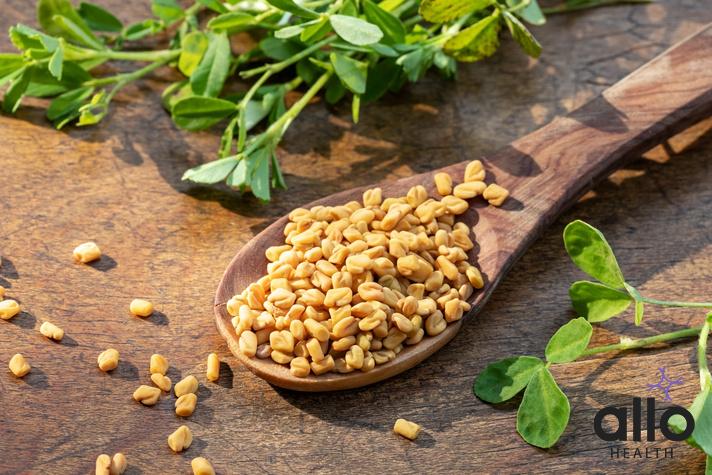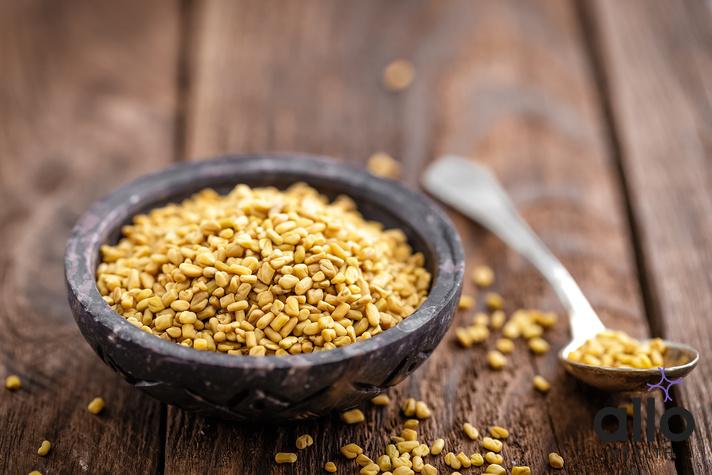The Traditional Uses Of Fenugreek Powder

Allo Health is dedicated to personalized well-being, offering support and trusted information tailored to individual health goals. The platform emphasizes human-generated content, led by a distinguished medical team of experts, including physicians and sexual health specialists. Their commitment to credibility involves rigorous fact-checking, authoritative research, and continuous updates to ensure accurate, up-to-date information. Allo Health's unique approach goes beyond conventional platforms, providing expert-led insights and a continuous commitment to excellence, with user feedback playing a crucial role in shaping the platform's authoritative voice.

Dr. Raj. R holds an undergraduate medical degree from the Philippines, and has a bachelors background in Psychology. His experience working in the field of urology further brought his interest forward in working towards his passion of understanding the science of attraction, intimacy, sex and relationships. A key motto he practices by remains unprejudiced and non-judgemental care.
Why This Was Upated?
Our experts continually monitor the health and wellness space, and we update our articles when new information became available.
Updated on 10 January, 2024
- Article was updated as part of our commitment to diversity, equity, and inclusion.

"The following blog article discusses food and diet-related information for general educational purposes. However, it is important to note that the information provided is not intended as personalized dietary advice and should not be considered a substitute for professional guidance from a registered dietitian or qualified healthcare professional. Before making any significant changes to your diet or nutrition plan, it is recommended to consult with a registered dietitian or healthcare professional.
Book consultation
Dietary changes can have a significant impact on your overall health and well-being. It is important to approach any changes to your diet in a balanced and sustainable manner, ensuring that you meet your nutritional needs and avoid any potential nutrient deficiencies. Rapid or extreme changes in dietary patterns can be detrimental to your health and may require professional guidance.
It is crucial to note that any specific dietary recommendations or guidelines mentioned in this article may not be appropriate for individuals with specific medical conditions, allergies, or intolerances. A registered dietitian or healthcare professional can provide individualized advice, including modifications or alternative food choices to accommodate your unique circumstances.
The information provided in this article may not encompass all possible dietary considerations or account for the latest research and nutritional guidelines."
Are you curious about the health benefits of fenugreek powder? This powerful spice has been used for centuries in traditional medicine. Now, research is starting to confirm its many benefits for digestion, diabetes management, breastfeeding mothers, hair growth, and more. Here’s what you need to know about fenugreek powder and how it can support your overall health and wellness.
What is Fenugreek Powder?
Fenugreek powder or methi powder is a spice made from grinding the seeds of the fenugreek plant, scientifically known as Trigonella foenum-graecum. Fenugreek is an annual herb native to the Mediterranean region, Southern Europe, and Western Asia, but it’s now cultivated in various parts of the world. The seeds of this plant have been used for culinary and medicinal purposes for centuries, and fenugreek powder is a popular ingredient in many cuisines, particularly in Indian, Middle Eastern, and North African cooking.
Here’s a detailed look at fenugreek powder:
- Production: Fenugreek or methi seeds are harvested from the fenugreek plant once they reach maturity. These seeds are then cleaned, dried, and ground into a fine powder using various methods, including traditional stone grinding or mechanical milling. The resulting powder is light yellow to brown in color, with a slightly bitter, nutty flavor and a distinctive aroma.
- Culinary Uses:
- Seasoning: Fenugreek powder is commonly used as a spice and seasoning in various dishes. It adds a unique flavor profile, described as both slightly sweet and slightly bitter, with hints of maple and celery.
- Curries and Stews: It’s a key ingredient in many Indian and Middle Eastern dishes, especially in curry powders, spice blends, and stews. It enhances the overall flavor and aroma of these dishes.
- Breads: Fenugreek powder is also used in the preparation of flatbreads like Indian roti and naan, as well as Ethiopian injera.
- Pickles: Some pickles and chutneys use fenugreek powder to impart a tangy and aromatic flavor.
- Health Benefits:
- Digestion: Fenugreek has been traditionally used to aid digestion and alleviate digestive concerns.
- Blood Sugar Regulation: Some studies suggest that fenugreek may help regulate blood sugar levels and could be beneficial for people with diabetes.
- Breastfeeding: Fenugreek is believed to help increase milk production in nursing mothers.
- Anti-Inflammatory: It contains compounds that may have anti-inflammatory properties.
- Cosmetic and Medicinal Uses:
- Fenugreek powder is sometimes used as an ingredient in cosmetics and skincare products due to its potential skin-soothing properties.
- It’s also used in traditional medicine systems like Ayurveda and Traditional Chinese Medicine (TCM) for various purposes, including as a remedy for various ailments.
- Aroma and Flavor: Fenugreek or methi powder has a strong, aromatic scent that is both sweet and slightly bitter. It contributes a distinctive flavor to dishes, making it a key component in the complex and layered taste of many regional cuisines.
- Storage: To preserve its flavor and aroma, fenugreek powder should be stored in an airtight container in a cool, dark place, away from direct sunlight and moisture.
Fenugreek powder is a versatile spice that adds depth and complexity to a wide range of dishes. It’s valued not only for its culinary uses but also for its potential health benefits and traditional medicinal applications. It should be used in moderation, as its strong flavor can easily overpower other ingredients in recipes.
The Nutritional Value of Fenugreek Powder
Fenugreek powder is not only known for its culinary and medicinal uses but also for its nutritional value. Here is a detailed breakdown of the nutritional components found in fenugreek powder per 100 grams:
- Calories: Fenugreek powder is relatively low in calories, providing approximately 323 calories per 100 grams.
- Protein: Fenugreek powder is a good source of protein, containing about 23 grams per 100 grams. This makes it a valuable addition to vegetarian and vegan diets, as it can contribute to protein intake.
- Carbohydrates: Fenugreek powder is primarily composed of carbohydrates, with roughly 58 grams per 100 grams. The carbohydrates in fenugreek include dietary fiber, which is beneficial for digestion.
- Dietary Fiber: Fenugreek powder is high in dietary fiber, with approximately 25 grams per 100 grams. Dietary fiber supports digestive health, helps regulate blood sugar levels, and can aid in weight management.
- Fats: Fenugreek powder contains a small amount of fat, about 6.4 grams per 100 grams. It is low in saturated fat and primarily consists of healthy monounsaturated and polyunsaturated fats.
- Vitamins:
- Vitamin B6: Fenugreek powder is a good source of vitamin B6, providing about 1.09 milligrams per 100 grams. Vitamin B6 is essential for various bodily functions, including metabolism and nervous system health.
- Folate (Vitamin B9): Fenugreek powder contains approximately 57 micrograms of folate per 100 grams. Folate is important for cell division and the synthesis of DNA.
- Minerals:
- Iron: Fenugreek powder is relatively rich in iron, with around 33.5 milligrams per 100 grams. Iron is crucial for oxygen transport in the blood and overall energy production.
- Magnesium: It contains about 191 milligrams of magnesium per 100 grams, which is important for muscle function, nerve function, and bone health.
- Phosphorus: Fenugreek powder contains about 296 milligrams of phosphorus per 100 grams, which is vital for bone and teeth health.
- Potassium: It provides approximately 770 milligrams of potassium per 100 grams, supporting heart health and fluid balance in the body.
- Antioxidants: Fenugreek seeds and their powder contain antioxidants, including flavonoids and polyphenols, which may help protect cells from oxidative damage.
- Other Compounds: Fenugreek also contains compounds like saponins, alkaloids, and steroidal sapogenins, which are believed to contribute to its various health benefits.
Fenugreek Powder Uses In Traditional Medicine
Fenugreek powder has a long history of use in traditional medicine systems around the world, including Ayurveda, Traditional Chinese Medicine (TCM), and traditional Arabic medicine. While its specific uses and formulations may vary among these systems, here are some of the key ways fenugreek powder has been traditionally used in medicine:
- Digestive Health:
- Ayurveda: In Ayurvedic medicine, fenugreek is believed to have digestive properties. It is used to alleviate digestive concerns such as indigestion, bloating, and constipation. Fenugreek seeds or powder may be consumed before meals to enhance digestion.
- Traditional Chinese Medicine (TCM): TCM also values fenugreek for its digestive benefits. It is used to stimulate appetite, improve digestion, and address symptoms like abdominal discomfort and diarrhea.
- Blood Sugar Regulation:
- Ayurveda: Fenugreek is considered a valuable herb for managing blood sugar levels in Ayurvedic medicine. It is believed to help lower blood sugar levels and is often recommended for individuals with diabetes.
- Traditional Arabic Medicine: Fenugreek seeds have been used in traditional Arabic medicine to help regulate blood sugar levels and manage diabetes symptoms.
- Respiratory Health:
- Ayurveda: Fenugreek has been used in Ayurvedic remedies to alleviate respiratory conditions such as coughs, bronchitis, and asthma. It is believed to help relieve congestion and soothe the respiratory tract.
- Traditional Arabic Medicine: Fenugreek has been used as a remedy for respiratory conditions and is believed to help loosen mucus and alleviate coughs.
- Women’s Health:
- Ayurveda: Fenugreek is sometimes recommended in Ayurvedic medicine to support women’s health. It is believed to have properties that can help regulate the menstrual cycle and alleviate discomfort during menstruation.
- Traditional Chinese Medicine (TCM): In TCM, fenugreek may be used to address menstrual irregularities and discomfort.
- Pain Relief:
- Traditional Arabic Medicine: Fenugreek has been used in traditional Arabic medicine for its potential pain-relieving properties. It may be applied topically as a poultice or taken internally to help alleviate various types of pain.
- Aphrodisiac:
- Ayurveda: Fenugreek is sometimes considered an aphrodisiac in Ayurvedic medicine and is believed to help enhance libido and sexual function.
- Breast Health:
- Traditional Arabic Medicine: Fenugreek seeds have been traditionally used to support breast health, including breast enlargement and lactation in nursing mothers.
- Anti-Inflammatory:
- Fenugreek is believed to possess anti-inflammatory properties in various traditional medicine systems and may be used to alleviate inflammation-related conditions.
It’s important to note that while fenugreek has a rich history of use in traditional medicine, its effectiveness for these purposes is often based on historical and anecdotal evidence. Scientific research on fenugreek’s medicinal properties is ongoing, and some of its traditional uses may not have strong scientific validation. As with any herbal remedy, it’s advisable to consult with a healthcare professional before using fenugreek powder for medicinal purposes, especially if you have underlying health conditions or are taking other medications.
Fenugreek Powder Uses In Sexual Medicine

Fenugreek powder has been traditionally used in various cultures as a natural remedy to address sexual health concerns. While many of its purported benefits in sexual medicine are based on traditional knowledge and anecdotal evidence, some studies have explored its potential effects. Here’s a detailed look at fenugreek powder’s uses in sexual medicine:
- Aphrodisiac Properties:
- Fenugreek has been traditionally considered an aphrodisiac in some cultures, including Ayurveda and traditional Arabic medicine. It is believed to enhance sexual desire and improve overall sexual function.
- Libido Enhancement:
- Some people use fenugreek powder to boost libido and sexual desire. This effect is often attributed to its potential to increase testosterone levels in men.
- Testosterone Levels:
- Fenugreek contains compounds like furostanolic saponins, which may contribute to an increase in testosterone levels. Testosterone is a hormone that plays a crucial role in sexual health, including libido and sexual performance.
- Several studies have explored the impact of fenugreek supplementation on testosterone levels. While some have shown a modest increase in testosterone, the results have been mixed and may not be consistent across all individuals.
- Erectile Dysfunction (ED):
- Some men use fenugreek as a natural remedy for mild cases of erectile dysfunction. The potential improvement in blood flow and testosterone levels may contribute to better erectile function.
- It’s important to note that fenugreek is not a substitute for medically prescribed treatments for more severe cases of ED.
- Sexual Stamina:
- Fenugreek has been used to improve sexual stamina and endurance in both men and women. It is believed to enhance overall physical vitality, which can positively impact sexual performance.
- Breast Health in Women:
- In traditional Arabic medicine, fenugreek has been used to promote breast health and enhance breast size. This use is based on the belief that fenugreek may contain compounds that mimic estrogen, a hormone that can influence breast development.
- Lactation Support:
- Fenugreek is known for its potential to increase breast milk production in nursing mothers. This effect is attributed to its galactagogue properties, which stimulate milk production.
- Hormonal Balance:
- Fenugreek may help regulate hormonal balance in both men and women, potentially improving overall sexual health and function.
While fenugreek powder has been used traditionally for sexual health purposes, scientific evidence supporting its effectiveness in sexual medicine is limited and inconclusive. Additionally, the effects of fenugreek can vary from person to person. If you are considering using fenugreek for sexual health concerns, it’s advisable to consult with a healthcare professional. They can provide guidance based on your specific circumstances and help you make informed decisions about potential treatments and remedies.
Precautions In Using Fenugreek Powder
While fenugreek powder has several potential health benefits and uses, it’s important to exercise caution and be aware of certain precautions when using it, especially if you plan to use it regularly or in larger quantities. Here are some important precautions to consider:
- Allergies and Sensitivities:
- Some individuals may be allergic to fenugreek or sensitive to it. Allergic reactions can range from mild skin rashes to severe anaphylactic reactions. If you’ve never consumed fenugreek before, start with a small amount to check for any adverse reactions.
- If you have known allergies to legumes, such as chickpeas or peanuts, you may be at a higher risk of being allergic to fenugreek, as it belongs to the same family.
- Blood Sugar Levels:
- Fenugreek has the potential to lower blood sugar levels, which can be beneficial for people with diabetes. If you’re already taking medications to lower blood sugar, combining them with fenugreek may lead to hypoglycemia (low blood sugar). Monitor your blood sugar levels closely and consult your healthcare provider for guidance on dosage adjustments.
- Pregnancy and Breastfeeding:
- Pregnant women should use fenugreek cautiously and consult with a healthcare professional before incorporating it into their diet or taking it as a supplement. While fenugreek has been used traditionally to stimulate lactation, its safety during pregnancy is not well-established.
- Nursing mothers should be aware that fenugreek may increase milk production, but excessive consumption can lead to potential side effects for both the mother and baby. It’s advisable to consult with a lactation consultant or healthcare provider for appropriate dosing and monitoring.
- Digestive Upset:
- Fenugreek, especially in large quantities, can cause digestive upset in some individuals. Common digestive concerns associated with fenugreek consumption include diarrhea, gas, and bloating. Start with a small amount and gradually increase the dosage to assess your tolerance.
- Medication Interactions:
- Fenugreek may interact with certain medications, particularly blood-thinning drugs (anticoagulants) and medications for diabetes. If you are taking any prescription medications, consult your healthcare provider before using fenugreek as a supplement or in culinary preparations.
- Skin Sensitivity:
- When fenugreek is applied topically as a poultice or paste, it can sometimes cause skin irritation or an allergic reaction in sensitive individuals. Perform a patch test on a small area of skin before applying it more extensively.
- Surgery:
- If you plan to undergo surgery, it’s advisable to discontinue fenugreek supplementation at least two weeks prior to the procedure, as it may have blood-thinning effects.
- Quality and Source:
- Ensure that you obtain fenugreek powder from a reputable source to ensure its purity and quality. Low-quality products may be contaminated or contain additives.
- Moderation:
- Fenugreek should be used in moderation, both in cooking and as a supplement. Excessive consumption may lead to unwanted side effects.
- Consult a Healthcare Professional:
- Before using fenugreek for any specific health concern or if you have underlying medical conditions, it’s best to consult with a healthcare provider who can provide personalized guidance based on your health history and needs.
By taking these precautions into account and seeking guidance from a healthcare professional when necessary, you can safely incorporate fenugreek powder into your diet or use it for various health purposes while minimizing potential risks.
Frequently Asked Questions
(1) What is fenugreek powder?
Fenugreek powder is a spice made by grinding the seeds of the fenugreek plant. It has a slightly bitter, nutty flavor and is used in various cuisines for its unique taste and potential health benefits.
(2) How is fenugreek powder made?
Fenugreek powder is made by harvesting fenugreek seeds, cleaning and drying them, and then grinding them into a fine powder. The powder can be used in cooking or for medicinal purposes.
(3) What are the health benefits of fenugreek powder?
Fenugreek powder may aid digestion, regulate blood sugar, and have anti-inflammatory properties. It’s also used to boost libido, support lactation, and as an herbal remedy in traditional medicine.
(4) Can fenugreek powder help with weight loss?
There’s limited evidence to suggest that fenugreek may aid weight loss by promoting a feeling of fullness, but it’s not a miracle solution. A balanced diet and regular exercise are key for weight management.
(5) Are there any side effects of fenugreek powder?
Some people may experience digestive concerns like gas or diarrhea with excessive fenugreek consumption. Allergic reactions are possible too. It’s best to use it in moderation.
(6) Can fenugreek powder be used during pregnancy?
Pregnant women should use fenugreek cautiously, and it’s advisable to consult a healthcare provider. It’s often used to stimulate lactation but should be used under supervision.
(7) Is fenugreek powder safe for breastfeeding mothers?
Fenugreek is commonly used to boost milk production in nursing mothers. Excessive consumption can have side effects. Consult a lactation consultant or healthcare provider for guidance.
(8) How can I incorporate fenugreek powder into my diet?
You can add fenugreek powder to soups, stews, curries, and spice blends. It’s also used in making flatbreads like roti and naan. Start with small amounts to adjust to the flavor.
(9) Can fenugreek powder interact with medications?
Fenugreek may interact with certain medications, like blood thinners and diabetes drugs. If you’re on medication, consult your healthcare provider before using fenugreek.
(10) Where can I buy fenugreek powder?
Fenugreek powder is available in most grocery stores, spice shops, and online. Ensure you purchase it from a reputable source to ensure quality and purity.






































